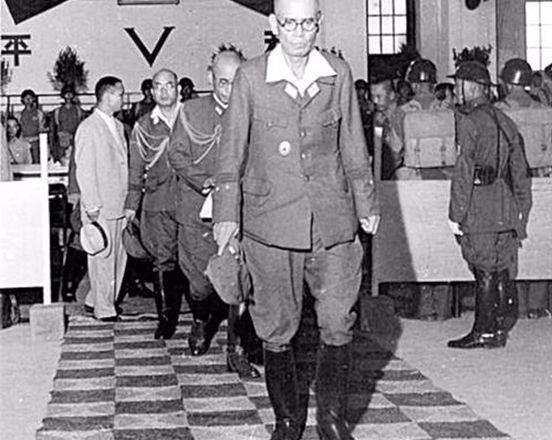The leader of the Japanese invasion of China, Okamura Ningji, held a million troops in his hands, and learning that Japan surrendered was like a thunderbolt on a sunny day

On August 6 and 9, 1945, the United States dropped atomic bombs called "Little Boy" and "Fat Man" on Hirosaki on Nagashima, and the United States used atomic bombs against Japan and the Soviet Union participated in the war against Japan, which accelerated Japan's surrender.
On the afternoon of August 6, the Japanese Emperor told Foreign Minister Togo that since the enemy had used this weapon, it was increasingly impossible to continue the war. In order to strive for favorable conditions, the opportunity to end the war should not be missed.
On the morning of August 9, Japan's Supreme War Guidance Council was convened, "which strengthened the determination of the Emperor, Minister Kidouchi, Prime Minister Suzuki, Foreign Minister Togo, Minister Minaihai, Konoe, Former Foreign Minister Shigemitsu, and other dignitaries who had always supported an early armistice, believing that there was no other way but to quickly accept the Potsdam Proclamation to end the war." ”
On August 10, the Japanese government sent a note to the United States, Britain, China, and the Soviet Union that it was ready to accept the provisions listed in the Potsdam Proclamation if the status of the emperor remained unchanged.
On 11 August, after consultation, the Allies decided to allow Japan to retain the Emperor, but the Emperor had to authorize and ensure that the Japanese Government and the Imperial Headquarters had signed the conditions of surrender necessary for the implementation of the Potsdam Proclamation, that the Emperor and the Japanese Government had to obey the orders of the Supreme Commander of the Allies, and that the U.S. Department of State, through the Swiss Government, would issue Soviet, American, British, and Chinese replies to Japan's declarations. On August 15, Japan broadcast nationwide the Emperor's edict accepting the Potsdam Proclamation and imposing unconditional surrender.
An important reason for Japan's rapid surrender was that the Soviet Union abandoned the treaty (signed after the Battle of Nomonkan to sign a non-aggression pact) to declare war on Japan, originally wanted to be completely destroyed through Soviet mediation, the Soviet army advanced rapidly, so that the United States and Japan did not expect that the Kwantung Army was vulnerable, and the United States and Japan did not want the Soviet army to infect the four islands of the Japanese mainland, otherwise it would be a second Germany! Therefore, it is inevitable that the United States will acquiesce in Japan's retention of the emperor system! They will not take notes to the other Allies at all and monopolize the right to dispose of Japan!
How did Japan's unconditional surrender feel when Okamura Ninji, the commander-in-chief of the Japanese army invading China and the commander-in-chief of the Chinese dispatch army, heard the news of Japan's surrender? Okamura received more than a dozen telegrams from August 10 to 15 in his later years, and his psychological emotions were also expressed in these dozens.
In 1937, Okamura ningji came to the United Front of China with 1.05 million elite troops, and he placed the emperor's high hopes on him. But his task in China is not yet complete. On August 12, 1945, a secret telegram was received on the joint dispatch of "Terrestrial Secret Telegram No. 61": "We are ready to accept it on the condition that we do not change the emperor's ruling power (Potsdam Proclamation), and if this condition is not met, we will resolutely complete the war." ”
Accepting the Potsdam Proclamation meant Japan's unconditional surrender, the first time Okamura officially learned that Japan was really about to surrender. In his memoirs, he has 4 words describing his first reaction at the time: "Thunderbolt on a sunny day."
On August 14, 1945, less than two hours after he had sent a telegram of instructions to the armies, his staff sent an urgent telegram from Tokyo, saying that "the worst state is a foregone conclusion." The worst is surrender, which shows that earth-shaking changes have taken place in Japan.
Okamura Ningji was already overwhelmed, whether the war was falling or not, only waiting for the telegram... In the evening, after Okamura rested, the army deputy commander sent an urgent telegram from Tokyo, asking for attention to listening to the emperor's "jade voice" at noon on the 15th.
At 12:00 noon on the 15th, in the exceptionally hot city of Nanjing, wearing military boots, Okamura, who was far away from the imperial palace, listened carefully to Hirohito's broadcast. When the Emperor announced his acceptance of the Potsdam Proclamation, he was already sweating profusely, and then received a secret telegram from the Army Province from "Continental No. 138", confirming surrender and asking him to "stop the combat operation" and carry it out to the whole army within 6 days.
Japan's announcement of unconditional surrender in China was the result of fourteen years of resistance by the Chinese people. Of course, the atomic bombs dropped by the United States on Japan's Hiroshima and Nagasaki were the trigger for Japan's surrender.